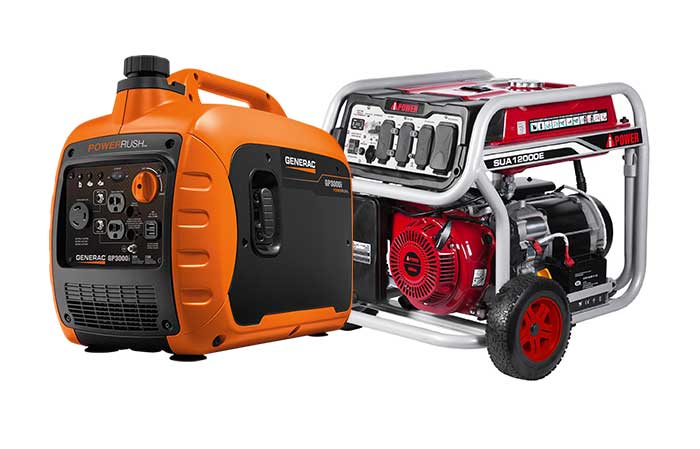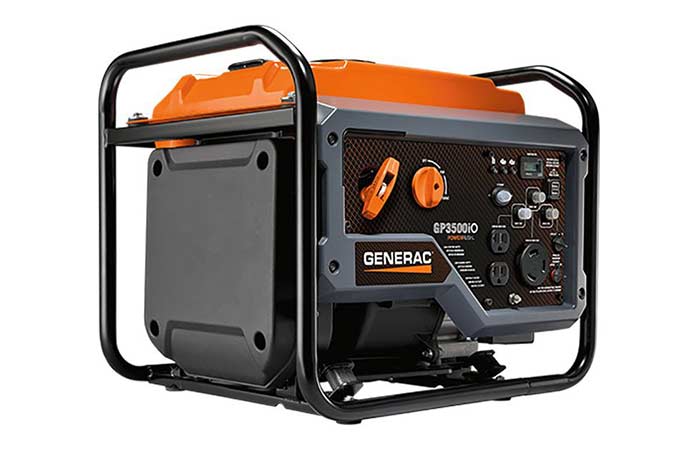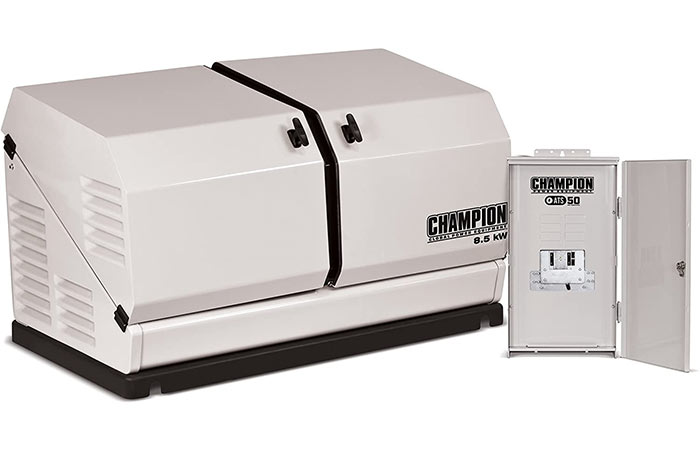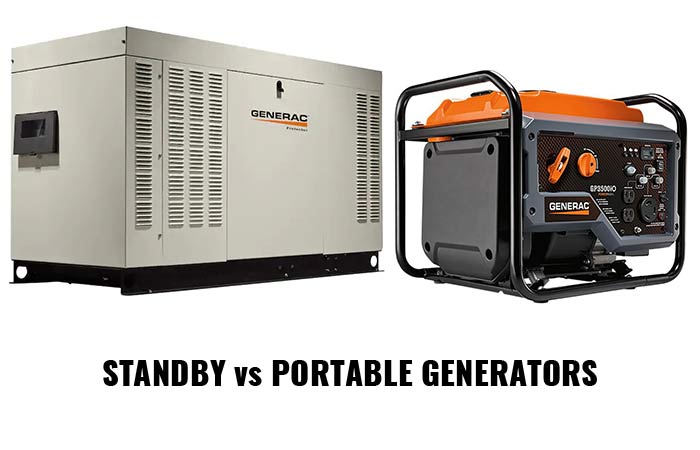When it comes to backup power at home or for businesses, most users choose between portable and standby generators. These generators share some features and advantages but they too have their major differences which are the basis of this article.
Portable generators, as their name suggests, are small-sized generators stored indoors but carried outdoors into a shade where it’s turned on and used to supply power to the house. They’re usually cheaper than standby generators and supply between 3000 and 8500 watts.
Standby generators, their names describing them in full, are usually always connected to the power source and will automatically turn on when the supply is cut like during a power blackout. Being on standby, these generators can be as large as needed since there is no movement required. As such, they can supply as much as 20,000 watts of power or even more.
Comparing Standby and Portable Generators
| Standby Generator | Portable Generator | |
| Capacity | Can be from 7,000 watts to 150,000 watts which is enough to power entire homes. | Can be from 500 watts to 7,000 watts which is just enough to power a few appliances or small homes. |
| Maintenance | Needs frequent and periodic maintenance by a technician. | Minimal maintenance that’s possible by the homeowner. |
| Fuel supply | Fueled by natural gas, propane or diesel and can be fueled by the household gas supply or large fuel tanks to run for several days on end. | Fueled usually by gasoline and can only be fueled by the generator’s own fuel tank which is only large enough to hold fuel for up to 12 hours for the larger generators. Fuel can’t be stored for too long as it would go stale. |
| Cost without installation | From $7,000 to $10,000 or more. | From $200 to $5,000 or more. |
| Space and installation | Installation is done outside by a certified technician and on a level surface usually made of prefabricated concrete. The base is usually skid-proof and can be anywhere from 3 to 10 feet in length and up to 5 feet in height. The enclosure is weather and sound proofed to protect the generator. | There is no installation required as the generator is mostly indoors and only taken outdoors when there’s a power outage. The carrying is done by the owner of the generator as it needs no technicalities. When outdoors, the generator will have some form of protection from the elements although most people just have a small shed with a roof and open sides. The protecting structure is thus noise and whether proof. |
| Longevity | Air-cooled generators have a longevity of about 1500 hours while the liquid-cooled ones can last up to 20000 hours of operation. It all depends on the amount of load for either generator type. | Usually last for about 2000 hours of run time also depending on the load. |
| Startup procedure | Connected through an automatic transfer switch. The switch starts the generator the moment power goes out. | Starting is manual with the recoil pull-cord or electric switch. The generator is turned on by the user in a power outage. |
From this table, it can be deduced that the standby generator is the more convenient one as it provides more power and on demand. However, it costs more and will need a technician to install and maintain it throughout its operation.
Portable Generators
Portable generators are meant to be moved about as needed. They are stored indoors and only taken out when there is need for power for the house or in an RV. A majority of portable generators run on gasoline although there is a good number running on propane and other fuels.

Most portable generators have a runtime of about 12 to 20 hours based on the size of the fuel tank and the runtime depends on the amount of the load in question.
Portable generators tend to be noisy while producing less power than their standby counterparts. The reason for this is that most of them aren’t noise proof unlike the standby ones. They also have wheel kits that allow for easy movement between points.
The power output of generators is often low and may not be enough to power whole houses. They also weigh much less with a single person being enough to move the generator from one point to the next.
Pros
- Cheaper to buy and install when compared to standby generators.
- Some portable generators can produce as much power as standby generators as they’re large enough for that.
- They can work without a transfer switch hence can be connected directly to the home or electrical appliances.
- Portable as they have a small size and most come with wheels and handles.
- The inverter type of generators can be directly used with electronics even the sensitive ones.

Cons
- It needs to be moved to the point where power is needed hence cumbersome.
- Given that most portable generators use gasoline, they need the fuel stored with a stabilizer to prevent it from going stale.
- Are noisy due to the lack of a noise-proof cover.
- Often provide less power than standby generators.
- Shorter run time and lifetime.
- If not stationed far enough from the building, it can cause carbon monoxide poisoning.
Portable generators are meant to provide convenience in terms of portability and flexibility. They’re also cheaper. However, they need to be turned on every time to provide power to the home.
Standby Generators
Also referred to as stationary generators, standby generators are usually larger and more permanent than their portable alternatives. The installation process is done by an expert with the generator put in a weatherproof structure. Looking at a standby generator, you’d easily mistake it for something else as it has a boxy shape with proper covering on the outside. This covering also helps keep down the noise levels of the standby generator.

The main advantage with standby generators is that they start automatically whenever there’s a power outage. This is advantageous in that you won’t need to run into the rain to turn it one when there’s a storm that takes out the power. The fact that most standby generators run on propane, natural gas and diesel means that they can go on for many hours with some even going for weeks without the need to turn them off.
Pros
- Very low maintenance and operation needed.
- Automatically turn on and off as per the power supply.
- Long run time with some even running for weeks on end.
- Due to having a cover, they are more protected from the weather than the portable generators.
- Usually quieter than portable generators due to the covering.
- Last for about 15 years.
- Improve the value of the home.
Cons
- Costly to buy and install.
- Require an expert to install and maintain.
With the right budget, you can enjoy the benefits of a standby generator.
Which is better and why?
When the two are compared, it comes down to the reason you’re going for the generator in the first place. If you’re doing it to power your home every now and again, you can use a large portable generator. You can also pick a portable generator when you need power in your RV or to run a few small home appliances.
On the other hand, if you need power on demand to run critical equipment such as freezers or life support machines, a standby generator is the way to go. It also produces more power and doesn’t require physical presence to work. As long as it’s in good running condition, it’ll come on immediately there’s a power outage.
Further Reading
